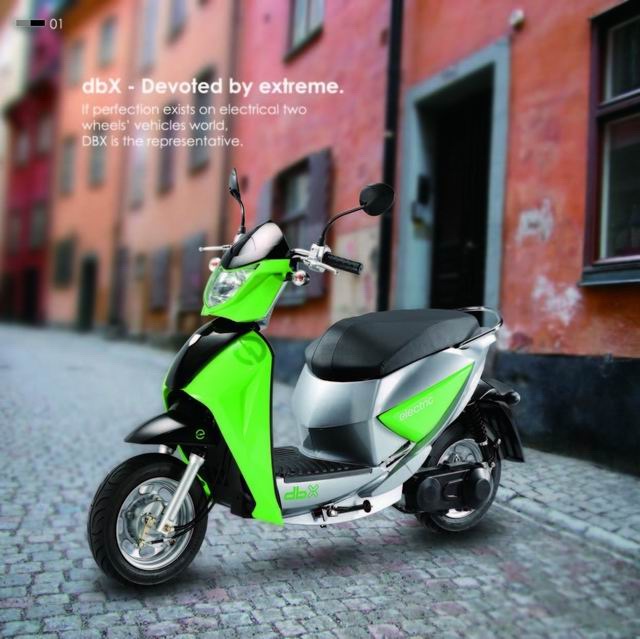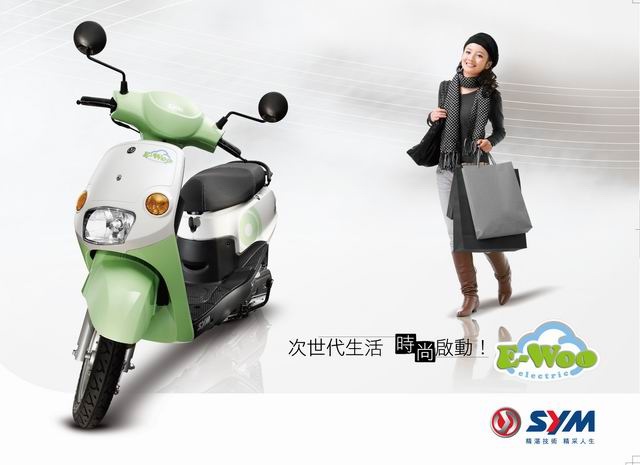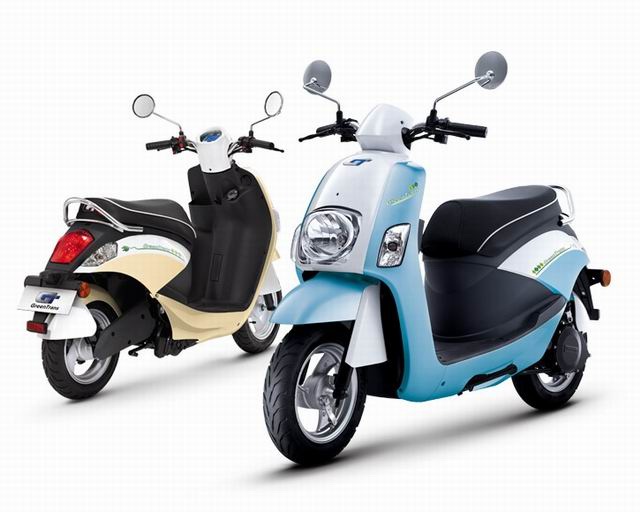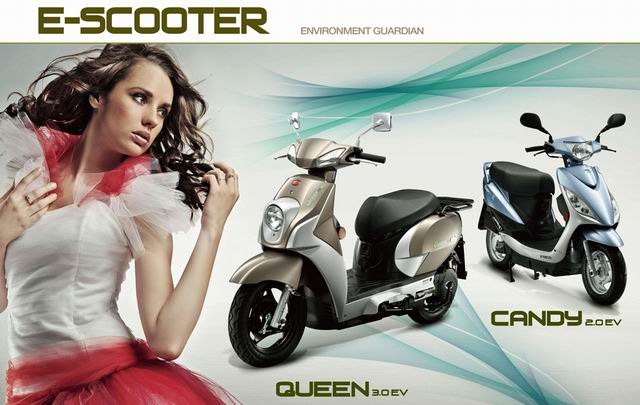Taiwan's IDB Sets Up World's First e-Scooter Standards
2013/07/15 | By Quincy LiangOfficial subsidies program to create demand for 100,000 e-scooters in 4 years
Taiwan is generally seen as heaven to promote electric scooters (e-scooters) due to many reasons, not least of which being geographically-mandated. The central alpine ridge forces most of the population to live in relatively small patches of land in the west. The extensive, well-built roads throughout the island, well-established industry to build quality powered two-wheelers (PTW), and perhaps the most relevant being most of the some 23 million people know better than to be stuck in urban gridlock, hence choosing motorcycles and scooters for short commutes, resulting in annual PTW sales of 700,000 to 800,000 units in recent years.
Both the government and local e-scooter makers have been cooperating closely to develop the e-scooter market for win-win results. The former purportedly is concerned about providing cleaner living environment for the people, subsidizing e-scooter buyers and building recharging infrastructure in pilot projects jointly sponsored by government units. Private e-scooter makers aim to increase popularity of e-scooters in Taiwan, so as to achieve scale of economy to strengthen export competitiveness.
A key factor for more efficient development of the e-scooter industry is a well-established standard, with which the government can set up industrial development strategies, subsidize qualified products and makers, and develop the market by encouraging product innovation and advancement. With the e-scooter market and industry being relative-new to private companies, unifying industrial standards can effectively shorten R&D time and identify proper directions for product and business development.
World's No.1 E-Scooter Testing Standard
As such the Taiwan E-Scooter Standard (TES) has been established by the Industrial Development Bureau (IDB) of the Ministry of Economic Affairs to protect consumer rights to buy useful, eco-friendly PTW, along with a comprehensive set of testing standards for e-scooters, first of its kind globally.
With the TES, the government also launched a thoughtful subsidy program to create demand for 100,000 e-scooters on roads in four years (2011-2014), including subsidies for consumers, reward for manufacturers, and subsidies to construct recharging facilities.
The TES testing works are jointly manned by Taiwan's Automotive Research & Testing Center (ARTC), Material and Chemical Research Laboratories (MCL) under Industrial Technology Research Institute (ITRI), and Electronics Testing Center (ETC), to assure durability, cruise range, hill climbing capacity, acceleration, and lithium-ion battery safety. In addition to passing TES tests, the IDB also requires all the e-scooter makers to provide repair and maintenance, roadside assistance, recharging etc. services, to offer all-round rider-friendliness on the island.

TES E-Scooter Specs for Gov't Subsidies Program
Items Light (Small) grade standard
Vehicle Safety Comply with TES-0A-09-01 “Safety rules of recharge system”
Comply with TES-0A-10-01 “Specific safety requirement for e-motorcycles”
Climbing
capacity Over 10km/h at 18% (12%) gradient
Maximum speed Over 50 (30mph)km/h
Acceleration From 0~100m, within 12sec (from 0~50m within 9 sec.)
Driving
range Over 40 (30mph) km in urban driving
Durability After accelerating/decelerating driving for 5,000 (3000miles) km without major failure, driving range shall retain 85% of initial test results
Battery capacity indication Min. 2km range before and after durability test upon low residual capacity
EMC Comply with TES-0A-07-01 EMC test methods for e-motorcycle
Battery module Safety Comply withTES-0B-01-01 “Methods of secondary lithium-ion battery safety test ”
Weight Sub-10kg for single module
Charging system Comply with TES-0A-08-01 “Safety guides of detachable battery module”
Source: IDB
Fruitful Development
Under efforts by the government and vehicle makers, currently 24 e-scooter models meeting the TES requirements have been developed by local companies. In addition to focusing on developing models suitable for short-distance transportation in urban areas, some local makers also have matched the government's policy to push more powerful and longer-range (with higher battery capacity) e-scooters for riding on Taiwan's offshore islands such as Penghu Island, Green Island, Lanyu Island etc. This move has effectively expanded the e-scooter rider group in Taiwan by offering a more comprehensive range of product models.

According to IDB, under the real-road test standard mapped out by the Ministry of Transportation and Communications (MOTC), which required double sitters (with total weight of higher than 150kg) on one e-scooter running counterclockwise around the island until the battery drains out. A total of eight e-scooter models passed the demanding tests by running 1.5 loops of the island (about 30km in distance), including Kwang Yang Motor Co., Ltd. (KYMCO brand)'s EA10FA (model name Candy 2.0) and EA10EA (Queen 3.0); EVT Technology's EVT-400e and EVT-168; China Motor Corp. (CMC)'s EM3A8, Sanyang Industry Co., Ltd. (SYM)'s ED1LU2 (E-Woo), Kentfa Advanced Technology Corp.'s CC-999, and DK City Corp.'s DBX. These models are expected to meet the demand from offshore island tourism, and the local transportation utilities on these offshore islands.
Cleaner Offshore Island
The Green Island, for example, IDB says, attracts some 400,000 tourists yearly. On round-island roads with total distance of about 20 km, some 2,500 leased powered two-wheeler (PTWs) are used every day, generating exhaust and noise to impact air quality and tranquility. The adoption of e-scooters on Green Island, as part of the governmental policy to promote such green vehicle on offshore islands, has achieved all round benefits for government, local inhabitants, and the e-scooter industry.
Governmental Support
"Carbon reduction" is not merely a slogan like 20 years ago, but a priority in many nations, and in Taiwan different levels of governments are aggressively trying to do more to achieve the goal.
Buying a TES-certified e-scooter in Taiwan qualifies for subsidies from different levels of governments, including NT$7,200 (US$240) for small light models to NT$10,000 (US$333) for small models from IDB, as well as NT$2,000 (US$67) to NT$15,000 (US$500) from local governments.
In 2012, Kaohsiun City in southern Taiwan won the e-scooter sales championship by licensing 1,541 units, accounting for about 20% of the total volume in Taiwan. The Kaohsiung City Government has been aggressively promoting the low-carbon transportation in recent years, and has mapped out many incentives such as free public buses, subsidize to Mass Rapid Transit (MRT)-public bus transfer, public-bicycle leasing stations, subsidies to the replacement of two-stroke PTWs, and subsidies to the purchase of e-scooters. Taoyuan City in northern Taiwan won the second place in e-scooter sales volume by licensing 1,471 units, commanding a 19% share of the island's total in 2012, followed by offshore Penghu County (1,282 units, or 16.4% share), and New Taipei City (1,268 units, 16.3% share).
IDB points out that the popularity of e-scooters in Taiwan has been steadily increasing in recent years, and is expected to grow rapidly with most local PTW riders realizing the advantages of e-scooters, backed by improving recharging and battery-swap conveniences.
Corporate E-scooter Users
To qualify for governmental subsidies to buy e-scooters without volume limit, as well as support governmental eco-protection policy, many state-run and private enterprises in Taiwan are adopting e-scooters to cut cost and build green corporate image.
In 2012, IDB says, a total of 266 enterprises in Taiwan purchased 2,280 TES-approved e-scooters, including the largest purchaser last year I Sun Green Energy, an e-scooter leasing company with operation mainly in Penghu, buying 707 units. I Sun currently leases the-scooters to inhabitants, students, delivery, B&Bs (breakfast and bed) in Penghu. The company ventured into e-scooter leasing business in 2011 and began providing such service in Penghu. Currently, the firm owns an e-scooter fleet of 810 units and has gradually expanded its services to other smaller islands of Penghu.
HeySong Group, a major food and soft-drink conglomerate in Taiwan, purchased 100 TES-approved e-scooters last year and sent them to merit distributors as encouragement, hoping the distributors to utilize these green vehicles to call upon customers and protect the environment, as well as make these e-scooters as "moving advertisements" of green vehicle to promote vehicle electrification in Taiwan.
Chung Hsin Electric & Machinery Mfg. Corp. Ltd.'s branch office in Taipei procured 40 e-scooters in 2012 and utilized them as the transportation vehicle for parking toll collectors. The branch office says that its contracted toll collectors work 12 hours per day and are continuously under moving status, so the e-scooters can save a lot of gasoline consumption and cut emission pollution. Chung Hsin points out that currently about 8,000 powered two-wheelers (PTWs) are ridden everyday throughout Taiwan by parking toll collectors, consuming about 8 million liters of gasoline and generating about 18 million kg CO2 every year (based on that a PTW runs less than 100 km per day). If all the internal combustion engine (ICE) toll-collector PTWs are replaced by e-scooters, the company says, the carbon-reduction effect equals to that by implanting 1.2 million trees. In addition to environment protection, each e-scooter operated under the above- mentioned conditions can cut operation cost by more than NT$60,000 (US$2,000) per year.
Many other companies are also adopting e-scooters as their transportation vehicles for different applications, including China Steel Corp., TSRC Corp., President Starbucks Coffee Corp., etc., IDB says.

CMC was the No. 1 e-scooter seller in Taiwan in 2012, vending 5,554 units for a 70% market share. The firm has been the leading e-scooter vendor for three straight years.
The firm's e-moving e-scooter models feature fashionable styling, high maneuverability, automated main stand, power reverse function, and even cruise control function. The considerate detail designs have won hot responses from female riders, who account for about 60% of the new buyers now.

TES-approved E-scooter Makers & Models* | |
"Light" Category (with max. Speed over 45kph) | |
EVT | EVT 4000E-BLM1 |
E-Ton | e-Go IBA3 |
DKcity | DBX |
SYM | E-Woo ED1LU2 |
KYMCO | Candy EA10FA |
CMC | e-Moving EM 1A 6 |
"Light Small" Category (with speeds from 35-45 kph) | |
Yamaha | EC-03 |
Kentfa | CC-888 |
TCV | TC502 |
GDP | GD-031-T |
*: As of April, 2013. Source: IDB | |




